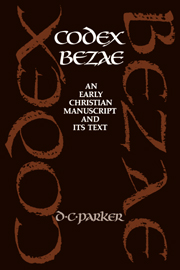Book contents
- Front Matter
- Contents
- List of illustrations
- Preface
- Abbreviations and textual conventions
- Introduction
- PART I The palaeography
- Chapter One The codex and the hand
- Chapter Two The punctuation
- Chapter Three The secondary hands
- Chapter Four Towards the codicology of a bilingual codex
- PART II The scribe and the tradition
- PART III The correctors
- PART IV The bilingual tradition
- Part V Text and codex
- Appendices
- Plates
- Notes on the plates
- Indexes
Chapter Four - Towards the codicology of a bilingual codex
Published online by Cambridge University Press: 09 November 2009
- Front Matter
- Contents
- List of illustrations
- Preface
- Abbreviations and textual conventions
- Introduction
- PART I The palaeography
- Chapter One The codex and the hand
- Chapter Two The punctuation
- Chapter Three The secondary hands
- Chapter Four Towards the codicology of a bilingual codex
- PART II The scribe and the tradition
- PART III The correctors
- PART IV The bilingual tradition
- Part V Text and codex
- Appendices
- Plates
- Notes on the plates
- Indexes
Summary
An analysis of the physical characteristics of bilingual manuscript traditions has yet to be made. Such an undertaking would be a valuable contribution to our knowledge of ancient manuscripts. At present we can hardly advance beyond seeking for the correct questions to be asked. Are there links between the different groups of bilinguals – for instance between those in Greek and Coptic and those in Greek and Latin? Can particular sizes of book be discerned? Can lay-outs on the page, rules with regard to use of scripts for running titles, colophons, and quire signatures? Are there different practices for bilinguals written for different purposes or according to their contents? How is a copyist's writing style affected by the adjacent scripts? What are the typical corruptions of a bilingual tradition? In what ways may it be superior to a monolingual one? Is there any continuity between ancient, Carolingian, and Renaissance Graeco-Latin manuscripts? The analysis of colophons and running titles which we undertook in chapter i enabled us to place the scribe of Codex Bezae within a Latin copying tradition. Can such studies be undertaken elsewhere?
It is impossible here to undertake a full-scale study of all bilingual manuscripts. However, some attempt to compare Codex Bezae with other bilinguals is desirable. Different though it is from most other biblical manuscripts known to us, we have no justification for assuming that its scribe's contemporaries will have seen it as so very different.
Information
- Type
- Chapter
- Information
- Codex BezaeAn Early Christian Manuscript and its Text, pp. 50 - 70Publisher: Cambridge University PressPrint publication year: 1992
